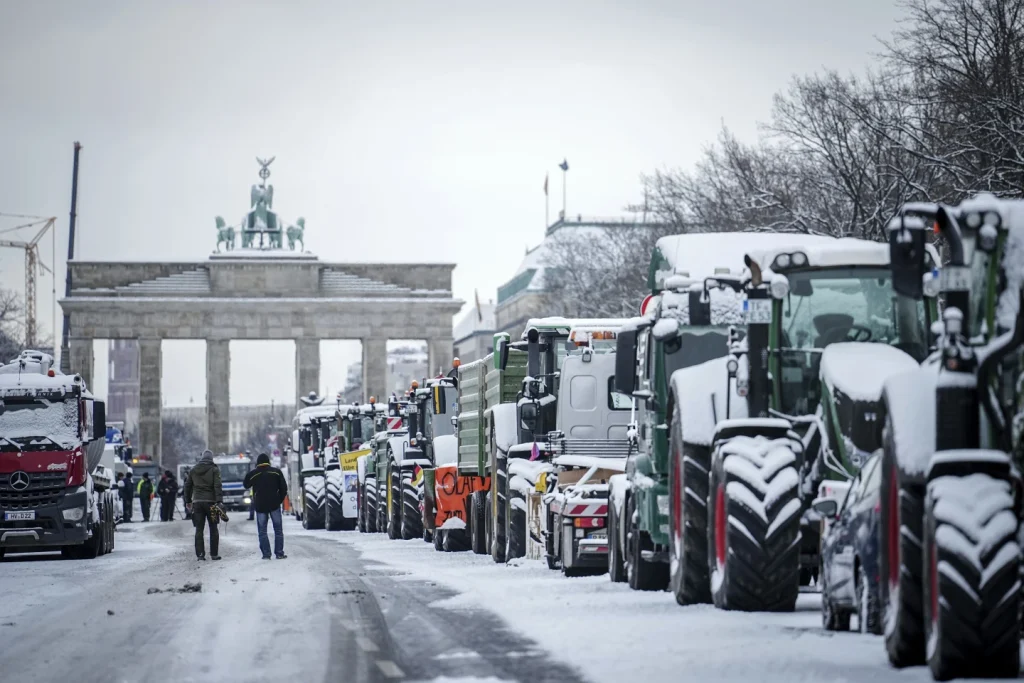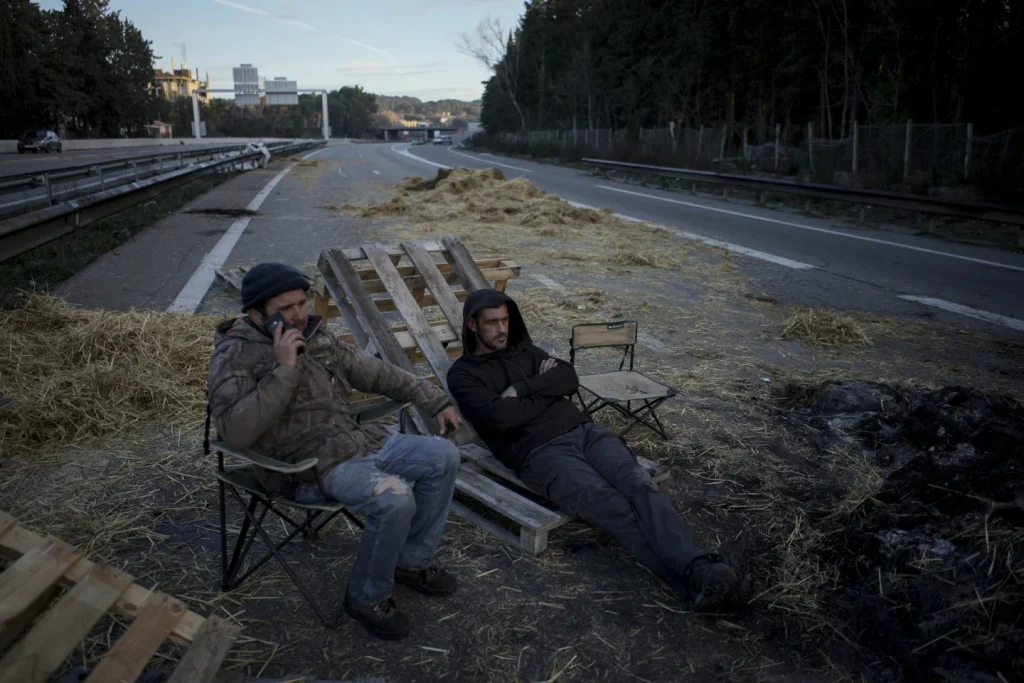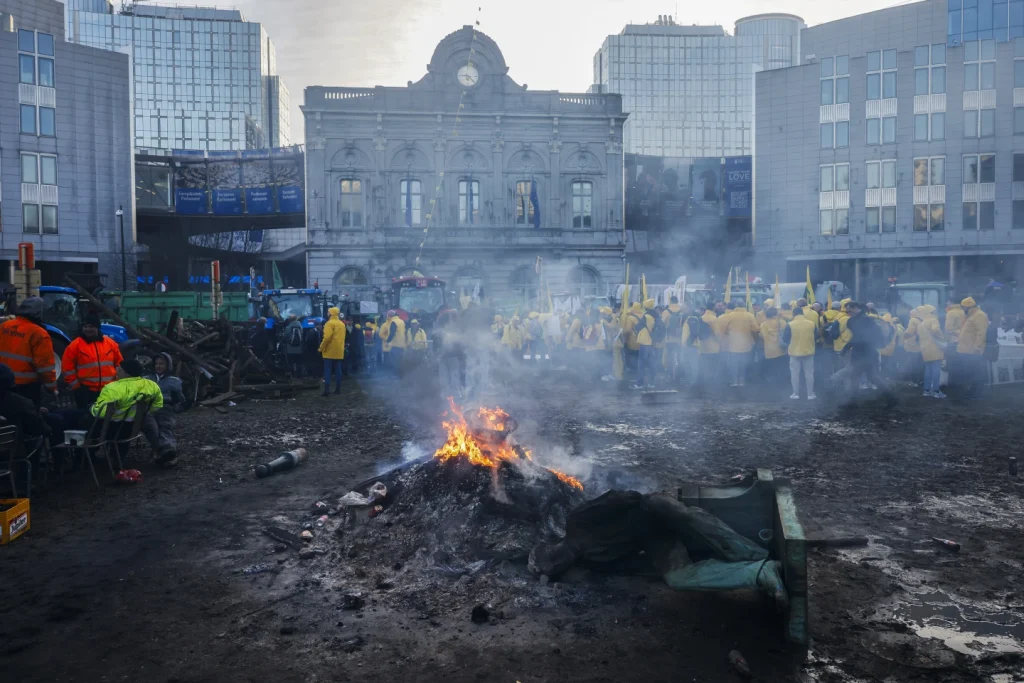In recent times, the sight of snow-dusted tractors forming a silent yet powerful assembly outside the iconic Brandenburg Gate in Berlin, and the striking imagery of nighttime protests in Romania adorned with vibrant national flags, have come to symbolize a growing and impactful farmer protest movement across Europe.
This movement, resonating with the collective voice of agricultural communities, has sparked significant demonstrations and garnered attention from the public, policymakers, and media alike.
The epicenter of these protests has been in France, where farmers have strategically utilized their tractors to block highways around Paris, yet the wave of discontent has rippled across the European Union, bringing to the forefront the profound and enduring challenges faced by the agricultural sector.
At its core, this movement has been ignited by concerns over inadequate wages, burdensome regulations, and the influx of low-cost imports, drawing participation from farmers in Spain, Italy, Germany, Romania, and Greece, all clamoring for decisive action.
The farmer protest movement in Europe has emerged as a potent expression of the accumulated grievances and enduring struggles within the agricultural domain.
With low wages, excessive regulatory constraints, and the inundation of cheap imports, farmers across the continent have found themselves grappling with a myriad of challenges that threaten their livelihoods and the sustainability of their operations.
In France, the heart of the demonstrations, farmers have resorted to utilizing their tractors as a visible symbol of their discontent, employing them to obstruct key transportation arteries, effectively bringing attention to the dire circumstances they face.

This form of protest has not only underscored the urgency of their demands but has also served as a poignant reminder of the vital role farmers play in sustaining the very fabric of society.
The resonance of this movement extends far beyond the borders of France, with farmers from diverse European nations joining hands in a unified call for action.
In Spain, Italy, Germany, Romania, and Greece, agricultural communities have mobilized to lend their voices to the collective outcry for change.
The protests in Berlin, set against the backdrop of the historic Brandenburg Gate, have not only symbolized the unity of purpose but have also underscored the gravity of the challenges faced by farmers across the continent.
Likewise, the nighttime protests in Romania, adorned with vivid national flags, have served as a vibrant testament to the solidarity and determination of farmers to seek redress for their grievances.
The widespread participation in these protests underscores the shared sense of urgency and the deeply entrenched nature of the issues plaguing the agricultural sector.
At the heart of the farmer protest movement in Europe lies a tapestry of challenges that have long plagued the agricultural community.
The issue of low wages, exacerbated by the rising cost of production and the volatility of market prices, has left farmers struggling to make ends meet.
Moreover, the burden of heavy regulation, often perceived as stifling and onerous, has further compounded the challenges faced by farmers, impeding their ability to innovate and adapt to changing market dynamics.

The influx of cheap imports, often subsidized by foreign governments, has presented a formidable obstacle, undermining the competitiveness of local produce and threatening the very survival of domestic agricultural enterprises.
In light of these challenges, the demands put forth by the protesting farmers encompass a spectrum of reforms, ranging from fair pricing mechanisms and subsidies to regulatory relief and measures to safeguard against the influx of low-cost imports.
The farmer protest movement in Europe holds profound implications for the agricultural sector and the broader socio-economic landscape.
It serves as a stark reminder of the critical role played by farmers in ensuring food security and the sustainable stewardship of the land.
Furthermore, it underscores the urgent need for policymakers and stakeholders to address the systemic challenges that have long plagued the agricultural community.
The movement also presents an opportunity for dialogue and collaboration, fostering a renewed sense of solidarity and understanding between farmers, policymakers, and the public at large.
As the protests continue to reverberate across Europe, it is imperative for concerted efforts to be made to engage in meaningful discourse and enact tangible reforms that address the underlying grievances of the agricultural community.

The farmer protest movement in Europe stands as a testament to the resilience, determination, and unity of purpose exhibited by agricultural communities across the continent.
It has brought to the forefront the deep-seated challenges faced by farmers and has served as a clarion call for decisive action to redress their grievances.
As the tractors remain lined up outside the Brandenburg Gate and the nighttime protests in Romania continue to unfold, the movement embodies a collective plea for recognition, support, and lasting change.
It is incumbent upon policymakers, stakeholders, and society at large to heed this call, engage in meaningful dialogue, and work towards implementing reforms that safeguard the livelihoods of farmers and ensure the sustainability of the agricultural sector.
In doing so, we can uphold the vital contributions of farmers and foster a more equitable and resilient agricultural landscape for generations to come.
The recent events across several European countries have highlighted the growing tension and unrest within the farming community.
In a striking display of frustration, lines of tractors rolled menacingly across a residential street in Poland and across a German bridge, while farming protesters in Italy resorted to burning spectacular nighttime fires by stone statues.
The chaos escalated as convoys with hundreds of angry farmers driving heavy-duty tractors descended upon the European Union’s headquarters, demanding relief from rising prices and bureaucratic hurdles.
This dramatic display not only caused disruptions but also brought the disgruntled farmers’ demands directly to the heart of EU policymaking.

Simultaneously, the situation in France added to the tumult, with traffic barricades on highways around Paris and a heightened police presence following measures announced by French Prime Minister Gabriel Attal to quell the unrest.
These events underscore the urgency for policymakers to address the concerns of the agricultural community and find sustainable solutions to alleviate their grievances.
